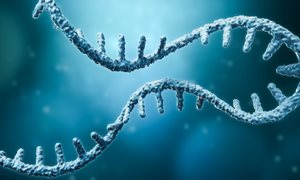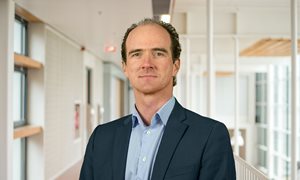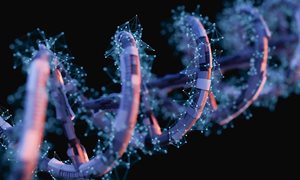
Neurologist Bart van de Warrenburg, together with Willeke van Roon-Mom and Annemieke Aartsma-Rus (both LUMC/Dutch Center for RNA Therapeutics), has been awarded 400,000 euros by the Dutch Brain Foundation. With this money they will take the first steps towards a genetic therapy for the rare hereditary movement disorder SCA7.
SCA7 is a hereditary disease of the cerebellum that leads to progressive gait and balance disorders, severe limitations in daily life and often premature death. In this disease, the retina is also affected, with severe deterioration of vision. Many patients develop their first symptoms in young adulthood. The earlier the disease starts, the more aggressive it becomes. There is currently no treatment for the disease.
Inhibiting damage with a piece of RNA
The project investigates whether it is possible to reduce the production of the harmful SCA7 protein with an artificially produced piece of hereditary material (an anti-sense oligonucleotide - AON). This technique is being tested in cultured nerve cells from the affected patients. In addition, the course of the disease is being carefully mapped out. At the end of the project, the three researchers want to take the step towards the first application of a therapy in patients.
Crowdfunding
Van de Warrenburg: "There is still much uncertainty about how developed therapies for very rare diseases can ultimately be implemented in healthcare, for example in terms of registration and reimbursement. Within the project there will be early consultations with regulatory bodies to coordinate this process for SCA7. In doing so, it can also act as a 'showcase' for similar initiatives." A special feature of this project is that part of the subsidy was raised by a crowdfunding campaign from patients and their relatives. They also remain actively involved in the project. For example, the patient representative becomes a member of the project team.
Expertise center
The Radboudumc is a recognized center of expertise for rare and inherited movement disorders and is part of the European Reference Network for Rare Neurological Disorders (ERN-RND).
More information on rare inherited movement disorders can be found here and here.
Related news items

Five million euro’s for joint research on rare movement disorders
29 March 2022 A Dutch consortium will receive almost 5 million euro’s from NWO to jointly start an ambitious project, called CureQ, on various rare and genetic brain disorders that lead to abnormal movements. Bart van de Warrenburg was one of the main applicants of this ‘Nationale Wetenschaps Agenda (NWA)’ grant. go to page
Aerobe exercise has a positive effect on brain function in Parkinson's disease patients
18 January 2022 Radboudumc researchers have shown that the brain function of patients with Parkinson's disease improved with regular exercise, which seems to strengthen the connections between different brain areas, while inhibiting brain shrinkage. go to page
New genetic defect links cell biology and protein glycosylation
10 November 2021 Peter Linders, Dirk Lefeber and Geert van den Bogaart together with international colleagues have recently reported on novel cell biological insights, by identifying a genetic disorder in syntaxin-5 which allowed to unravel a new mechanism regulating intracellular transportation. go to page
Impact of COVID-19 pandemic on mental health of Parkinson's patients
10 November 2021 The COVID-19 pandemic has introduced challenges to the social life and care of people with Parkinson’s disease (PD), which could potentially worsen mental health problems. A new study investigated this associaten and explored whether mental health and quality of life can be improved. go to page
Tiny blood vessels, big problems Radboudumc receives grant for international collaboration
3 November 2021 The Radboudumc, together with the University of Cambridge, receives a grant of €1.8M from three collaborating cardiac foundations for international research into the small blood vessels in the brain. This study will be led by Neurologist Frank-Erik de Leeuw and internist Niels Riksen. go to page